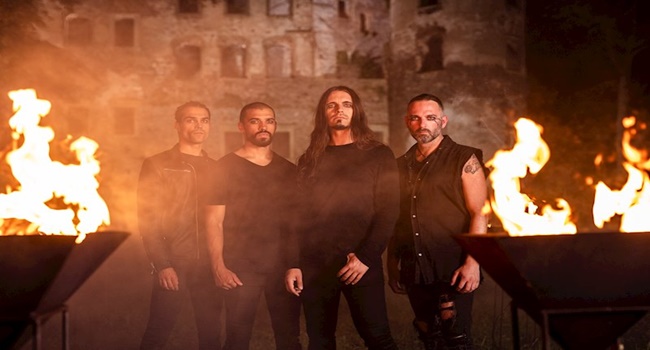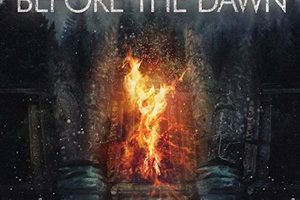Thulcandra – Enter the Abyss
Thursday, 25th May 2023
Successfully delivering extreme metal in two distinct outfits, guitarist Steffen Kummerer has been able to establish both Obscura and the current band under the microscope Thulcandra to a global community for decades. Although the career paths and output may differ, the quest for respect, admiration, and creative freedom remains strong. Thulcandra with their fifth album Hail the Abyss continues to be a force in the melodic black/death metal movement – this time probably releasing their most diverse outing to date.
We were able to catch up with Steffen while in the studio working on the next Obscura studio album. We learn more regarding the pandemic bringing Hail the Abyss to the listeners quicker than usual, the differences between Obscura and Thulcandra, how teamwork has helped the ascent upward for both bands, thoughts on the recent North American tour, his thoughts on the active upswing of extreme metal’s popularity globally, plus what’s on the horizon.
Dead Rhetoric: The fifth Thulcandra album Hail the Abyss hits the streets approximately eighteen months after the last effort A Dying Wish. Do you believe the extended downtime away from shows due to the pandemic allowed you to be more creative and productive – and where do you see this set of material sitting in the discography of the band?
Steffen Kummerer: Well, yes, the pandemic had something to do with how fast the new album came together. When A Dying Wish was released one and a half, almost two years ago, we were not sure if shows would happen. We had a couple of shows planned in Germany, they got postponed or cancelled. Instead of forcing another tour or another show, we decided we would start writing new songs. Since we had the same framework as the previous record, the same audio engineers where we recorded the drums and everything else, we had the same people in one room, it made things very convenient and fast to make a new album.
The second part of your question, where do I see Hail the Abyss in the discography. I think it’s the next step after A Dying Wish. It’s a little bit more diverse. We have faster but also very much slower songs within the entire record. Every song is entirely different, so each song does not sound like the next one. The feedback we have is very positive so far, and we are very happy with the album.
Dead Rhetoric: Can you discuss the importance of renowned musician/producer Dan Swanö as well as returning cover artist Herbert Lochner when it comes to those additional, professional touches they add with their skill sets to make the final product that much stronger and special in the end?
Kummerer: First of all, Dan Swanö is a very fantastic and experienced person. We enjoyed working with him again. He took over mixing and mastering the record. We recorded everything in Munich in two different studios, and sent everything to Dan. He is responsible for this very natural sound. We decided not to edit everything – it’s not polished, there are some raw parts, real life feeling parts on the album that simply showcase us as a real band. Dan understands what we want and where we want to go. I don’t want to have an album that sounds like everyone else – I want to have an album that has personal touches from each musician represented in the sound and he really captured that. It’s very rock ‘n’ roll, the feeling on the album.
And Herbert Lochner continues what we started with the previous record. He will work on a few more artworks in the future for the band. It’s the continual approach we have, we always want to work with the artist, the mixing engineer, it’s always on the long-term. He understands what we want, the visuals, he paints by hand. He delivers a real, painted piece in oil. He also sends me the original artwork, I have them on canvas in my home. I can’t wait to work with him for another record.
Dead Rhetoric: You shot official videos for “As I Walk Through the Gateway” and the title track – how do you believe these video shoots went, and where do you see the importance of the visual medium in garnering more attention for the band, especially in these social media platform driven times?
Kummerer: We produced both videos with a company called G13 Production House, in Poland. They are quite famous within the scene, they’ve worked with Amon Amarth, Behemoth, and many other quality, big bands. For me it’s very important to deliver something that we can identify with for ourselves. We’ve been able to produce high-end videos that will be seen around the world. We are an underground band, we aren’t going to be a touring band that you see at every festival or going on tour every year, that’s simply something we cannot make and do. For us, being represented with two proper music videos for both songs, it’s the best thing that can happen. It’s the first impression you get of the band, either as an old fan or a newer fan. For me, music videos are very important these days. We put a lot of effort, budget, and time into these music videos.
Dead Rhetoric: Is it a challenge at this point to decide what songs to premiere from the album, to give the right first impressions for what people can expect on the record?
Kummerer: Absolutely. As I mentioned, we have songs that don’t sound the same on the record. It’s very hard to choose the one song that will represent the whole album. That’s quite hard. That’s also the reason why we have four singles planned – the two video clips, there is a visualizer, and there will be another single released on the day of the album release. With those songs, we think we more or less captured the entire vibe of the record. I can only recommend listening to the album from front to back, and I hope there are at least one or two songs within the album that convinces you to like it.
Dead Rhetoric: Considering the varied approach to the record, was it also a challenge to decide the track listing front to back in terms of the flow of the record?
Kummerer: In parts, yes. From day one, it was clear which song would be the opening track and which song would be the closing track. Everything in between, we decided the flow of the record. We put all the songs together in one playlist, and then we felt the flow had to make sense. Sometimes you need a contrast- you can’t have five blast beat-driven tracks in a row. It is a try out. And that took a couple of days to decide with the entire band. We really take a lot of time and think about it – we are from the generation where you listen to full albums, not just one song or one single. An album has to tell a certain story, from the first song on the CD/vinyl to the very end. You listen to each song and understand why there are certain spots on the album. This is something personal that we love.
Dead Rhetoric: You mentioned teamwork earlier on in the interview. Can you discuss the importance of working with Napalm Records for this band? Do you feel they have a proper understanding of how to promote the efforts of Thulcandra and what you want to achieve?
Kummerer: This is the fifth album we’ve released as a band, and all of our albums have been released through Napalm Records. Of course, we are not the biggest band on the label. We are one of many, many other great artists, great bands on the roster. We had to prove that we are well worth the investment to promote this music. With each album, the band has been growing, we have been showing we are working hard as a band. Not just with the stage shows, the live performances, but everything we do. Piece by piece we have built up a strong relationship with Napalm Records – and in return, the label has put more and more effort into the band. For example, the new album will be released for the very first time within a big box set. That’s always a big investment for a record label. It shows and proves that they believe in our band. I’m very happy how everything has worked with Napalm so far, and I think we will release another record through them.
It’s teamwork. It’s not only the band or only the label that makes success happen. Everyone in the band and the team around this works together. We are very grateful for the cooperation we have with Napalm Records.
Dead Rhetoric: Do you have a preference for the studio or the stage when it comes to your activities as a musician – or do you find that each possess their own unique ways of enjoyment, just for different reasons?
Kummerer: To be honest, I love the balance. I love both. This year and last year with both bands I played around one hundred and fifty concerts, and there are more to come. Single shows, with festival concerts in Europe. It’s about time to look into some studio time. When I work for two or three months in the studio, I definitely need to go out on the road. It’s a matter of balance in life, and I like both.
Dead Rhetoric: You recently completed a North American tour run with Fleshgod Apocalypse and Wolfheart while doing double duty between Thulcandra and Obscura. How do you think this run went, and do you believe that coming out of the pandemic, the thirst and hunger for extreme metal on the live front is as strong (if not stronger) than ever?
Kummerer: This tour was a full success from beginning to end. First of all, we had nine or ten sold-out shows, most of the venues were packed to the max. It was a pleasure playing that tour – introducing Thulcandra within a package like this was excellent. Even as the first band there were so many people who really liked the band. We were in a good position to introduce the band to a North American audience. Personally, all the characters of the tour were excellent – talking to Fleshgod Apocalypse, Wolfheart, and the people on our team with Obscura and Thulcandra. Weeks after the tour, we are happy with how things went. All the bands helped each other – we faced a couple of issues because of weather. We had one show where we barely made it to the show because one of the highways and hills was closed, it took forever to find a way around. Instead of cancelling the support bands, all the bands decided to cut setlists, so all the bands got a chance to play. It proves you are working with great people; I really respect this.
For Thulcandra we are working on another North American tour for early 2024. This will be a headlining run, so we can play not only five or six songs – but the entire set.
Dead Rhetoric: You’ve mentioned in a previous interview for our site that Thulcandra exists for different reasons than your work in Obscura, due to professional career obligations for the musicians in one act versus the other. Does this mean your goals and expectations differ between the two bands, while still maintaining the artistic freedom most musicians crave?
Kummerer: That’s very hard to say. Both bands work entirely differently. Obscura is a touring band. For every album release we play between one hundred and fifty to two hundred concerts. Thulcandra is very different. We perform select dates. We did this North American tour simply because it was the right tour at the right time, but we will not become a band you see on every tour or every festival, this is not possible. The other band members are not making a living out of music, so we reduce things to every concert, or tour that happens once a year or every two years, we want it to be something special that people should really enjoy. Thulcandra, we live close to each other in southern Germany, we rehearse constantly, at least once a month or every six weeks to maintain. Obscura is very different – we don’t even live on the same continent. It’s a little bit more complicated.
For me, both bands are important. I simply love it. In my life, I’ve only founded two bands. Twenty-one years ago, Obscura, and twenty years ago Thulcandra. I never did any side projects or solo records, I just focused on these two bands. Both bands give me the freedom to write music in these certain musical styles. I’m very happy that people have picked up on both bands, and they constantly grow and somehow succeed within this niche that heavy metal is.
Dead Rhetoric: Where do you see the state of extreme metal on a global scale? What aspects do you enjoy most, and what changes (if any) would you like to see made for the greater good of the musicians and supporters?
Kummerer: I think these days are excellent, and haven’t been better before, to release very extreme music, or very niche music. It’s very easy to get instruments for a decent price. It’s very easy to record music and put it out, publish even a very grindcore record through Spotify or any other outlet worldwide. This enhances the artistic freedom of the entire scene. It doesn’t matter what kind of musical style you play, if you have an idea as a musician at home, you have the option to get it out. How you promote it, that’s a different story. The fact that you can produce music, whatever kind it is, it’s so easy these days. There are going to be more records released than ever before.
On the other side, this can be a problem because there are so many bands trying to go on tour and play shows, everything is totally oversaturated. In the end, the music industry is ever changing. Since sheet music was released hundreds of years ago, it’s a constant change and you simply have to go with the changes. There are bands releasing great albums that constantly have success, and there are bands that come out of nowhere that release a best album in a certain genre that you haven’t heard anything from them before, and it stays super interesting. Every month if you follow the scene you are in, in my case I love black and death metal the most, prog recently – there are so many bands I get recommendations from friends, they are fantastic.
The financial part, this is another big topic. Nobody will know how this will end. As a matter of fact, there has been more money made this past year than ten years before, in all platforms before. There is more music consumed than ten years ago. This leads to new horizons, new options. From my point of view, there is always a chance to make a living or success. If you don’t want to make a living, just get your music out there – and this is fantastic.
Dead Rhetoric: How do you maintain sanity amidst all the hectic activities that come with being a musician at your stature? Are there specific ways or techniques you use to unwind and regain focus perspective to practice self-care?
Kummerer: For me, it’s discipline. I am very disciplined when it comes to my daily routine. I try not to do too many things at a time. I don’t need to record a new album every half year. I don’t need to work on a thousand different side projects. I try to do this the best way possible. Sometimes you get busy, sometimes you have some time off. I just try to keep things balanced.
Dead Rhetoric: What worries or concerns do you have about the world that we live in today? Where do you think the leaders of the world need to put more time, energy, and focus on so that future generations will benefit from these measures?
Kummerer: The world was always fucked up – I don’t remember a time where it’s ever been perfect. There will always be a war on this planet – maybe two, maybe three. There will always be a catastrophe. I doubt this will change at all.
Dead Rhetoric: What’s on the horizon for any activities related to Thulcandra, Obscura, or any other endeavors over the next year or so?
Kummerer: Right now, I’m in Sweden, in Gothenburg, working at Studio Fredman on the new Obscura release. We are working on re-releasing all the Obscura records on vinyl. At the same time, Napalm Records asked if we are interested in re-releasing all the Thulcandra records on vinyl. We just mixed a live record for Thulcandra as well. And on the touring front, we have opportunities for both bands. Not at the same time in the same package – I don’t want to force another double duty tour, as this was very demanding. Both bands will see a couple of live dates. Obscura will tour South America, Asia, probably Australia again. Thulcandra will do some festival shows, and a North American tour in 2024. We have a lot of things to do, very exciting news.




























